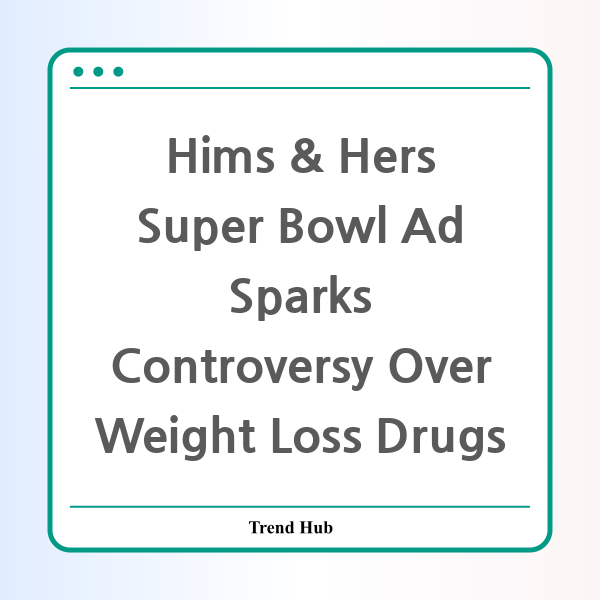* This website participates in the Amazon Affiliate Program and earns from qualifying purchases.

As the Super Bowl approaches, one advertisement has ignited significant debate: the controversial Hims & Hers Super Bowl ad promoting a weight loss drug. This ad not only highlights the burgeoning world of telehealth but also brings to light the complexities surrounding the marketing of weight loss medications.
The advertisement targets the massive $160 billion weight loss industry, showcasing an individual effortlessly selecting weight-loss solutions via a smartphone app. However, the ad has faced backlash from various drug industry allies, including the Partnership for Safe Medicines, which argues that it fails to adequately disclose critical safety risks associated with the advertised medications.
Notably, while the ad does not specify the medication it promotes, it is widely understood to reference semaglutide, commonly sold under the brand names Wegovy and Ozempic, developed by Novo Nordisk. This omission has led concerned groups to reach out to the Food and Drug Administration (FDA) to take action against what they deem misleading marketing practices.
Critics of the ad, including Senators Dick Durbin and Roger Marshall, emphasize that it risks misleading patients by not providing essential information about the potential side effects and safety of the drugs being promoted. In their critique, they insist that transparency is crucial in advertising, especially in the realm of drugs that can have significant health implications.
Hims & Hers, a telehealth platform that connects customers with licensed health providers for evaluations and prescriptions, argues that they are not classified as drug manufacturers and thus are not held to the same stringent advertising regulations. In their defense, the company asserts that they adhere to applicable advertising standards for telehealth services and are merely providing options in a broken system.
This ongoing controversy sheds light on a larger discussion regarding the intersection of health, safety, and marketing. The Partnership for Safe Medicines has gone so far as to label the advertisement as "misleading in its entirety," arguing that it does not account for potential risks and side effects, which are essential considerations for patients seeking weight loss solutions.
Moreover, the debate highlights the current tensions within the pharmaceutical industry, particularly regarding compounded drugs. These drugs, which are often marketed as alternatives to brand-name medications, are created by compounding pharmacies and are subject to different regulations. The FDA has allowed compounded versions of semaglutide to be sold amidst drug shortages, but as these shortages resolve, stricter regulations loom, which may impact how these alternative medications are marketed and sold.
The outcome of this Super Bowl ad dispute is more than just a marketing issue; it could set precedents for how telehealth companies advertise medications in the future. With the Super Bowl drawing a worldwide audience, it raises awareness about the importance of informed choices in health care, particularly in the face of aggressive marketing tactics.
As the game approaches, viewers will not only be watching for touchdowns but also for how this advertisement will play out in the broader context of health, safety, and corporate accountability. This scenario exemplifies the ongoing challenges faced by consumers when navigating the plethora of weight loss options available today and underscores the vital need for transparency and regulation in health product advertising.
* This website participates in the Amazon Affiliate Program and earns from qualifying purchases.